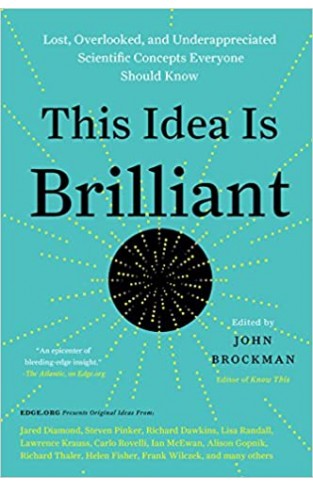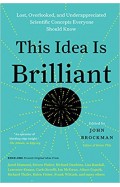- Home
- Non Fiction
- Politics & Current Affairs
- This Idea Is Brilliant: Lost, Overlooked, and Underappreciated Scientific Concepts Everyone Should Know - Paperback
This Idea Is Brilliant: Lost, Overlooked, and Underappreciated Scientific Concepts Everyone Should Know - Paperback
By: John Brockman
-
Rs 1,426.75
- Rs 2,195.00
- 35%
You save Rs 768.25.
Due to constant currency fluctuation, prices are subject to change with or without notice.
What scientific term or concept ought to be more widely known? That is the question John Brockman, publisher of the acclaimed science salon Edge.org (“The world’s smartest website”—The Guardian), presented to 205 of the world’s most influential thinkers from across the intellectual spectrum—award-winning physicists, economists, psychologists, philosophers, novelists, artists, and more. From the origins of the universe to the order of everyday life, This Idea Is Brilliant takes readers on a tour of the bold, exciting, and underappreciated scientific concepts that will enrich every mind.
Pulitzer Prize–winning author of Guns, Germs, and Steel JARED DIAMOND on the lost brilliance of common sense * Oxford evolutionary biologist RICHARD DAWKINS on how The Genetic Book of the Dead could reconstruct ecological history * philosopher REBECCA NEWBERGER GOLDSTEIN on how to extend our grasp of reality beyond what we can see and touch * author of Seven Brief Lessons on Physics CARLO ROVELLI on the interconnected fabric of information * Booker Prize–winning novelist IAN McEWAN on the Navier-Stokes equations, which govern everything from weather prediction to aircraft design and blood flow * cosmologist LAWRENCE M. KRAUSS on the hidden blessings of uncertainty * psychologist STEVEN PINKER on the fight against entropy * Nobel Prize–winning economist RICHARD THALER on the visionary power of the “premortem” * Grammy Award–winning musician BRIAN ENO on confirmation bias in the Internet age * advertising guru RORY SUTHERLAND on the world-changing power of sex appeal * Harvard physicist LISA RANDALL on the power of the obvious * Wired founding editor KEVIN KELLY on how to optimize your chances at success * Nobel Prize winner FRANK WILCZEK on the creative potential of complementarity * Pulitzer Prize–winning New York Times reporter JOHN MARKOFF on the synthetic metamaterials that soon will transform industry and technology * euroscientist SAM HARRIS on the lost art of intellectual honesty *Berkeley psychologist ALISON GOPNIK on the role of life history in the human story, and many others, including DANIEL C. DENNETT, JIM HOLT, HELEN FISHER, MARTIN REES, DANIEL GOLEMAN, STEWART BRAND, HANS ULRICH OBRIST, GEORGE CHURCH, DOUGLAS RUSHKOFF, SEAN CARROLL, RICHARD NISBETT, and MICHAEL GAZZANIGA.
What scientific term or concept ought to be more widely known? That is the question John Brockman, publisher of the acclaimed science salon Edge.org (“The world’s smartest website”—The Guardian), presented to 205 of the world’s most influential thinkers from across the intellectual spectrum—award-winning physicists, economists, psychologists, philosophers, novelists, artists, and more. From the origins of the universe to the order of everyday life, This Idea Is Brilliant takes readers on a tour of the bold, exciting, and underappreciated scientific concepts that will enrich every mind.
Pulitzer Prize–winning author of Guns, Germs, and Steel JARED DIAMOND on the lost brilliance of common sense * Oxford evolutionary biologist RICHARD DAWKINS on how The Genetic Book of the Dead could reconstruct ecological history * philosopher REBECCA NEWBERGER GOLDSTEIN on how to extend our grasp of reality beyond what we can see and touch * author of Seven Brief Lessons on Physics CARLO ROVELLI on the interconnected fabric of information * Booker Prize–winning novelist IAN McEWAN on the Navier-Stokes equations, which govern everything from weather prediction to aircraft design and blood flow * cosmologist LAWRENCE M. KRAUSS on the hidden blessings of uncertainty * psychologist STEVEN PINKER on the fight against entropy * Nobel Prize–winning economist RICHARD THALER on the visionary power of the “premortem” * Grammy Award–winning musician BRIAN ENO on confirmation bias in the Internet age * advertising guru RORY SUTHERLAND on the world-changing power of sex appeal * Harvard physicist LISA RANDALL on the power of the obvious * Wired founding editor KEVIN KELLY on how to optimize your chances at success * Nobel Prize winner FRANK WILCZEK on the creative potential of complementarity * Pulitzer Prize–winning New York Times reporter JOHN MARKOFF on the synthetic metamaterials that soon will transform industry and technology * euroscientist SAM HARRIS on the lost art of intellectual honesty *Berkeley psychologist ALISON GOPNIK on the role of life history in the human story, and many others, including DANIEL C. DENNETT, JIM HOLT, HELEN FISHER, MARTIN REES, DANIEL GOLEMAN, STEWART BRAND, HANS ULRICH OBRIST, GEORGE CHURCH, DOUGLAS RUSHKOFF, SEAN CARROLL, RICHARD NISBETT, and MICHAEL GAZZANIGA.
This Idea Is Brilliant: Lost, Overlooked, and Underappreciated Scientific Concepts Everyone Should Know - Paperback
By: John Brockman
Rs 1,426.75 Rs 2,195.00 Ex Tax :Rs 1,426.75
Zubin Mehta: A Musical Journey (An Authorized Biography)
By: VOID - Bakhtiar K. Dadabhoy
Rs 472.50 Rs 1,050.00 Ex Tax :Rs 472.50
The Origins of Political Order From Prehuman Times to the French RevolutioN
By: Francis Fukuyama
Rs 3,505.50 Rs 3,895.00 Ex Tax :Rs 3,505.50
Manning Up: How the Rise of Women Has Turned Men into Boys
By: Kay Hymowitz
Rs 646.75 Rs 995.00 Ex Tax :Rs 646.75
The Obama Syndrome: Surrender At Home War Abroad
By: Tariq Ali
Rs 1,165.50 Rs 1,295.00 Ex Tax :Rs 1,165.50
The Quest For Meaning: Developing A Philosophy Of Pluralism
By: Tariq Ramadan
Rs 1,255.50 Rs 1,395.00 Ex Tax :Rs 1,255.50
The Pakistan US Conundrum Jihadists The Military And The People The Struggle For Control
By: Yunas Samad
Rs 1,255.50 Rs 1,395.00 Ex Tax :Rs 1,255.50
An Enemy We Created: The Myth Of The Taliban Al Qaeda Merger In Afghanistan 19702010
By: Alex Strick van Linschoten
Rs 3,412.50 Rs 5,250.00 Ex Tax :Rs 3,412.50
WikiLeaks: Inside Julian Assanges War on Secrecy
By: David Leigh & Luke Harding
Rs 552.50 Rs 850.00 Ex Tax :Rs 552.50
No similar books from this author available at the moment.
No recently viewed books available at the moment.
Zubin Mehta: A Musical Journey (An Authorized Biography)
By: VOID - Bakhtiar K. Dadabhoy
Rs 472.50 Rs 1,050.00 Ex Tax :Rs 472.50
This Idea Is Brilliant: Lost, Overlooked, and Underappreciated Scientific Concepts Everyone Should Know - Paperback
By: John Brockman
Rs 1,426.75 Rs 2,195.00 Ex Tax :Rs 1,426.75














-120x187.jpg?q6)





-120x187.jpg?q6)



-120x187.jpg?q6)



